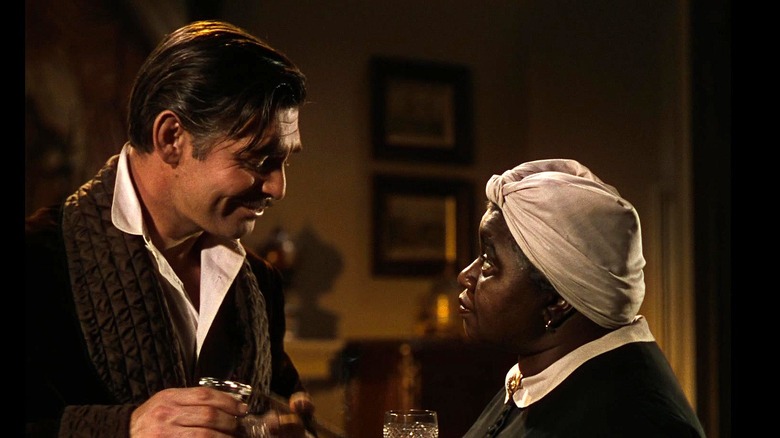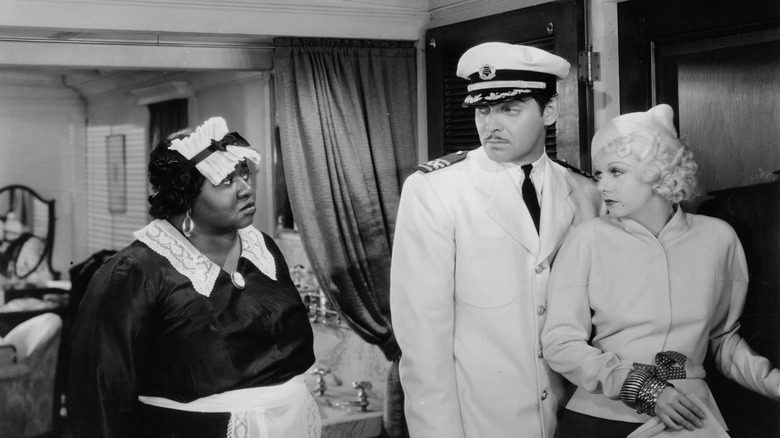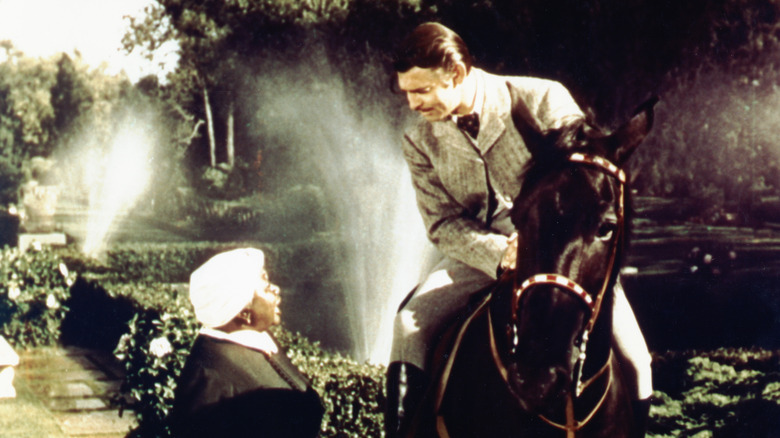The Truth About Clark Gable's Relationship With Hattie McDaniel
We may receive a commission on purchases made from links.
In February 1940, Hattie McDaniel, wearing a turquoise gown and gardenias in her hair, accepted an Academy Award for her role as enslaved person Mammy in the blockbuster film "Gone with the Wind." She'd just become the first Black person to win Hollywood's highest honor, helping to open the door for others. After she gave her speech, actor Clark Gable rushed up to her and shook her hand vigorously. The two were friends, and Gable had fought for McDaniel to get the part for which she'd just been honored.
Gable played the role of Rhett Butler in the film. By then, he had earned the "King of Hollywood" title and was one of the highest-paid actors of the era. McDaniel, on the other hand, had to fight for everything she earned while battling a racist system. Even her night of glory had been marred by the Academy Awards' venue — the segregated Cocoanut Grove nightclub at the Ambassador Hotel. It forced her to sit at the back of the room away from her other costars, echoing the messed up truth of "Gone with the Wind," which included racist tropes and portrayed slavery in a positive light, among other issues. Still, despite their differences, McDaniel and Gable enjoyed a close friendship, which began five years earlier.
Hattie McDaniel and Clark Gable met on a film set
Hattie McDaniel had an unconventional path into show business. She was born on June 10, 1895 (some sources list 1893) in Wichita, Kansas, and grew up poor in Denver Colorado. Her parents had formerly been enslaved, and McDaniel began performing while young. As an adult, she joined a traveling minstrel group and later moved on to radio as one of the first Black performers in the medium. While living in Los Angeles, she starred in the radio show "The Optimistic Do-Nuts" and was dubbed Hi-Hat Hattie. From there, she made the jump to film.
By 1935, McDaniel was in her early 40s, had already had hundreds of roles (mostly uncredited), and was slowly moving up the Hollywood ladder. That year, she appeared as a maid in "China Seas," but again, she was uncredited in the film. Even so, Metro-Goldwyn-Mayer referred to her as "one of the most prominent performers of her race" when promoting the comedy (via The Hollywood Reporter). It was on the set of this film that she met Clark Gable, and the two became fast friends.
Gable, like McDaniel, had come to Hollywood via a circuitous route, and he too had grown up poor. He was the son of an itinerant oil-field worker, lost his mother while still an infant, and reportedly left school at 16. Gable held down various jobs, including as an oilfield worker, before turning to acting, but even as a big star, he was considered a loner.
Clark Gable and Hattie McDaniel in Gone with the Wind
While working together on "Gone with the Wind," Clark Gable loved to play pranks on Hattie McDaniel. During one scene in which the pair are having a celebratory drink of whiskey following the birth of his character's daughter, McDaniel complained she was tired of drinking the colored water used for the scene. Gable surreptitiously switched the water with high-end Scotch, and in the next take, McDaniel got a big surprise. "It was the real stuff, so they say, and they tell me it was good, but I don't know because it was burning my mouth so," she recalled (via "Hattie: The Life of Hattie McDaniel"). The next morning, as Gable passed by McDaniel, he asked her, "Mammy, how's the hangover?" Also, during filming, the pair ate soul food together, and when Gable caught a cold, McDaniel mothered him, bringing him her homemade cough syrup.
After filming on "Gone with the Wind" ended, Gable learned McDaniel wasn't allowed to attend the film's premiere in Atlanta due to the state's Jim Crow laws that barred her from being in a "white's only" theater. He was so infuriated he planned on boycotting the premier. McDaniel insisted he go, and he ultimately did.
McDaniel died of breast cancer in 1952 at age 59. She donated her Oscar to Howard University, but the award later mysteriously disappeared. While Gable sent flowers to her funeral, he didn't attend. He himself died at age 59 following a sudden heart attack in 1960.


